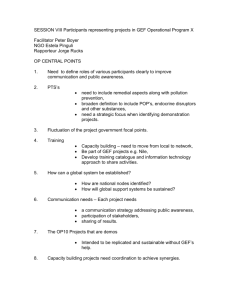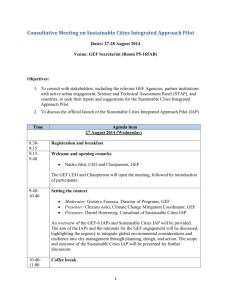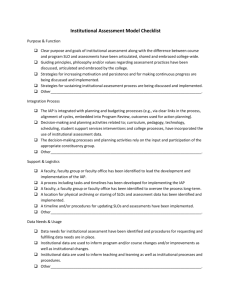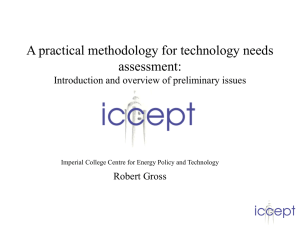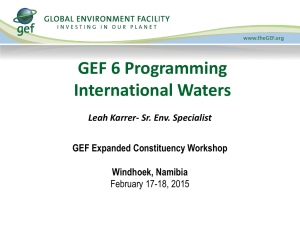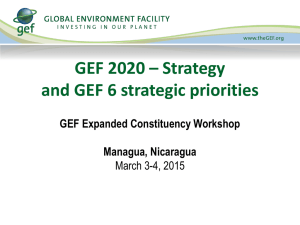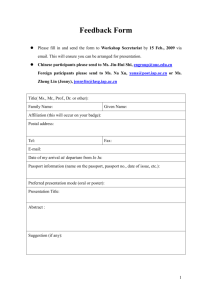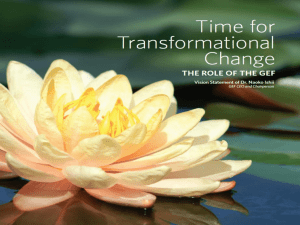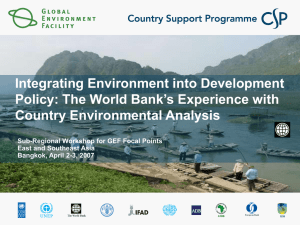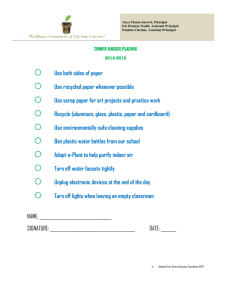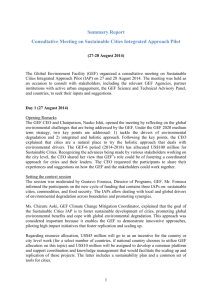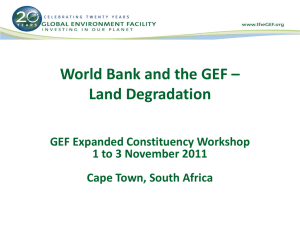Integrated Approach - Global Environment Facility
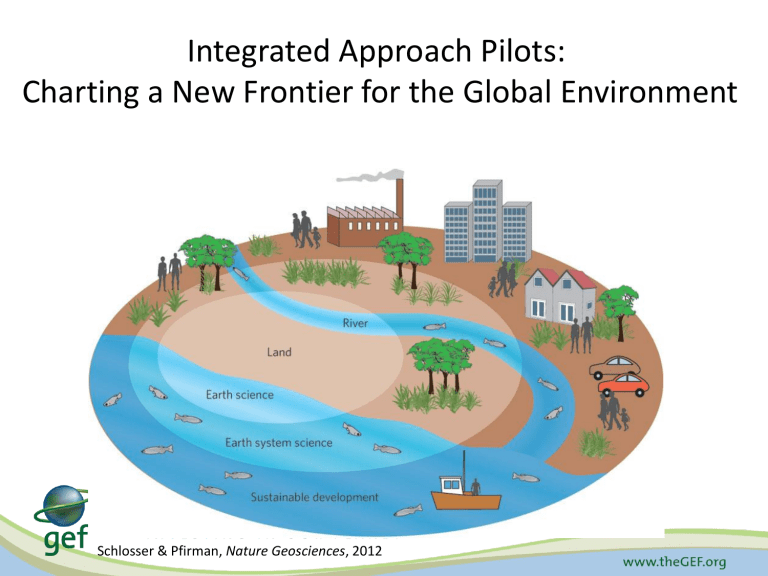
Integrated Approach Pilots:
Charting a New Frontier for the Global Environment
Schlosser & Pfirman, Nature Geosciences, 2012
GEF-6 Integrated Approach Pilots (IAP)
1.
Taking Deforestation out of Commodities Supply Chain
2.
Food Security in Sub-Saharan Africa
3.
Sustainable Cities
Deliver global environmental benefits beyond single GEF focal area
Time-bound nature of concrete impact
Relevance for Sustainable Development
Innovative way to support action at multiple levels based on partnership
IAP 1: Taking Deforestation Out of
Commodity Supply Chains
Linking long-term national sustainable development policies and programs with day-to-day value chain management approaches
Market-based approach
Enhance understanding among decision makers
Enhance investment in sustainable commodities
Strengthen enabling environment
Support uptake of best production practice
Whole value-chain engagement
Components of Commodities IAP
Increase of
Supply through means which do not lead to deforestation
- Producers
- Services Providers
- Local Communities
- Buyers
- Traders
- Processors
Increase of
Demand for
Sustainable
Commodities
Taking
Deforestation
Out of
Commodity
Supply Chains
Enabling
Environment &
Facilitating
Conditions
- National Governments
- Financial Institutions
Global Consortium for Commodities IAP
Programming Process
• June 2014 – Theory of Change prepared and potential approaches considered by agencies and GEFSEC
• July 2014 – Agencies met to agree on ToC and outline structure
• August 2014 – Implementation structured agreed between agencies
• September onwards –Preliminary Steering Group established, regular fortnightly SG telephone conference calls + specific work groups
• Partners joining, eg. The Gordon and Betty Moore Foundation
• Stakeholder discussion events are being programmed in Indonesia,
Brazil and China within the next 5 weeks involving governmental, private sector, civil society stakeholders, as well as other active organizations and existing initiatives and donors.
OVERALL SCORE
IAP 2: Food Security
Score 0-100, 100=best environment
Score 72.2 to 89.3
Score 54.5 to 72.1
Score 38.4 to 54.4
Score 24.8 to 38.3
EIU Global Food Security Index - 2014
Potential for Transformational Impact
• Agriculture and Food Security major development priorities
• CAADP pillars on food security, land and water management
• Evergreen Agriculture focus on smallholder farmers and food value chains
Opportunity for integration of Ecosystem Services sustainability and resilience
An Integrated Approach
Fostering Sustainability and
Resilience for Food Security
• Multi-stakeholder platforms
• Institutions and policies
Engage
Act
• Incentives
• Working at scale -
Scaling-up of interventions
• Monitoring &
Assessment
Track
Adaptive Management and Learning
Dryland regions
Smallholder agriculture
Target 10-12 countries initially
Geographical Targets for Food Security IAP
SAHEL
EAST AFRICAN
HIGHLANDS
HORN OF
AFRICA
SOUTHERN
AFRICA
Conceptual
Phase
Program Development Plan
• Concept
Development
• Consultations with key
Stakeholders
• Engagement with GEF
Agencies
• Document for
GEF
Replenishment
Meeting
Completed
Program
Design Phase
•Characterization of Target
Geographies
• Country engagement and
Institutional frameworks
• Refinement of
Results framework for the Program
Completed
Operational
Design Phase
• Programming of resources
• Framework for
Implementation
• Final Program
Document(s) for
GEF Council
IAP 3: Sustainable Cities
Urgency to integrate global environmental considerations and resilience into city management through planning, design, and action
Enhancing partnership towards impact
Supporting goals of Multilateral
Environmental Conventions
Going beyond traditional, single GEF focal area project
Proposed Program Structure
Overall SC-IAP Coordination
(World Bank + GEF Secretariat)
High-Level Advisory
Committee
Consultative
Committee
$10 million
$45 million
Global Coordination & Knowledge Sharing Platform
City Pilot #1 City Pilot #2 City Pilot #3 City Pilot #4 Etc.
at least $45 million matching STAR Allocation
Proposed Global Coordination &
Knowledge Sharing Platform
World Bank leading development of this global component
Intended to provide range of support services to pilot cities
Working groups with partner agencies and relevant stakeholders further refining how global knowledge platform will work in practice
Sustainable Cities IAP Development
Conceptual development:
1 st consultative meeting (August 2014)
Global coordination and knowledge sharing mechanism development
Discussion with interested countries on pilot projects and potential partners
Submission of expressions of interest from several countries
2 nd consultative meeting (February 2015)
Country component development and consultation
Aiming for GEF Council approval in June 2015
Outreach and reporting:
Announcement at UN Secretary General’s Climate Summit
Progress report to GEF Council in November 2014 and update
Sustainable Cities GEF side event at COP 20
